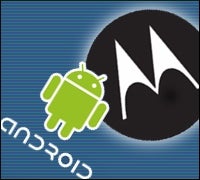 |
On the heels of reports that Motorola is dramatically expanding its Android development effort, the company is staying mum, but industry watchers are wondering whether the news, if true, represents a misstep on the road to a turnaround.
Motorola declined to comment on a TechCrunch report yesterday that cited an Android developer, who had been courted by a Motorola (NYSE: MOT) headhunter, saying the handset maker is expanding its Android development team from 50 members to 350.
The news comes as Motorola continues its quest to regain market share lost during the past two years, before which it was enjoying a No. 2 position in the industry and strong sales thanks to the RAZR mobile phone. Since then, it’s failed to come up with a hit. Complicating chances for a comeback have been newcomers to the space like Apple, with its popular iPhone, and Research in Motion, which is proving successful in wooing consumers to its BlackBerry devices.
That’s to say nothing of the expected threat stemming from last week’s debut of HTC’s G1 handset, which is built on the new Google-backed Android platform. While Motorola competes with HTC, it’s also a founding member of the Open Handset Alliance, which developed the Android platform, and is in position to produce devices based on that operating system.
Still, it’s remaining mum on precisely how it might go about taking advantage of Android.
“Motorola is pleased to see the industry enthusiasm and support of the Android operating system,” a Motorola spokesperson told InternetNews.com. “Motorola believes Android promises to be one of the most powerful, flexible and customizable open platforms, enabling truly integrated mobile hardware, software and Web experiences.”
“We’re excited about the innovation possibilities on Android and look forward to delivering great products in partnership with Google and the Open Handset Alliance community,” they said.
Motorola’s mobile device strategy already includes several platforms: it’s own Linux-based MOTOMAGX, Microsoft Windows Mobile 6.1, Qualcomm’s BREW, Nokia-owned Symbian and the Symbian-based UIQ.
It’s not clear what role Android would play among Motorola’s array of mobile operating systems. During an analyst meeting earlier this month, Motorola co-CEO Greg Brown spoke enthusiastically about the company’s continued partnership with Microsoft (NASDAQ: MSFT) and Windows Mobile 6.1, describing it as a complementary technology to both consumer and the rugged device segments of its business.
During his talk, Brown also acknowledged the importance of other platforms Motorola uses.
Focus needed?
However, one industry watcher suggested that growing an already large stable of operating systems could prove dangerous for Motorola, now cemented in third pace in the industry behind Nokia (NYSE: NOK) and Samsung.
Instead, what Motorola needs is a clearer mobile device strategy, according to Carolina Milanesi, research director for mobile devices at Gartner.
“They need to make a decision quick on what they’re going to focus on, platform-wise,” Milanesi told InternetNews.com.
Additionally, Milanesi dismissed the Android hiring report as too expansive, given wider changes taking place within Motorola’s mobile division.
“That seems to be a lot of people being hired at a time when Motorola developers are likely leaving,” she said, noting that Sanjay Jha, the mobile group’s recently minted CEO, is likely “cleaning house” given the intended spin-off of Jha’s division next year.
In March, Motorola announced plans to split its core mobile and broadband businesses into two publicly owned companies. Last month, it named Jha as the new mobile device head and co-CEO of Motorola proper.
Following his appointment, Jha began a 90-day review process of Motorola’s product development cycle, supply chain and distribution processes. He also told investors that his next step is to more quickly push out devices, noting Motorola has 25 new products slated for 2009.


